PRESSING PLAY ON PAUSED PROJECTS IN THE COVID-19 ERA
Since March, the COVID-19 pandemic has changed the way we work, the way we live, and the way we interact with the world. To cope with these widespread changes, organizations have had to make tough choices and “hit the pause button”, delaying projects and strategic initiatives.
We are now seeing enterprises reinstating their paused projects and initiatives, but in a changed world where challenges such as limited and/or remote staff, constrained budgets, and emerging competing priorities need to be factored into the mix. Organizations need to relaunch project work in a strategic way that accounts for today’s ever-changing business climate as well as the increased pressure employees are facing while navigating the complex COVID era.
Before deciding to restart a project, consider the following questions:
1. Are there environmental, emotional, or other considerations that should be taken into account before kicking off this project again?
2. Is the project still relevant and does it represent a productive use of time?
3. Staffing levels may have been impacted. Team members may be overwhelmed with competing priorities. Does the organization have adequate staffing and resourcing for this project or is there a need to secure outside assistance to support internal staff?
4. Does this project provide clear benefits regardless of possible uncertainty in the future?
5. Are there risks and costs to the organization by further delaying the project?
Strategies for moving forward
Applying a comprehensive strategic framework to think through the complex logistical, financial, and human components of the project can help an organization ensure multiple angles have been considered before moving forward with stalled projects.
The steps outlined here are relevant for any project initiation, but it’s particularly crucial now to make sure that the organization is fully prepared to launch an initiative in a thoughtful and informed way.
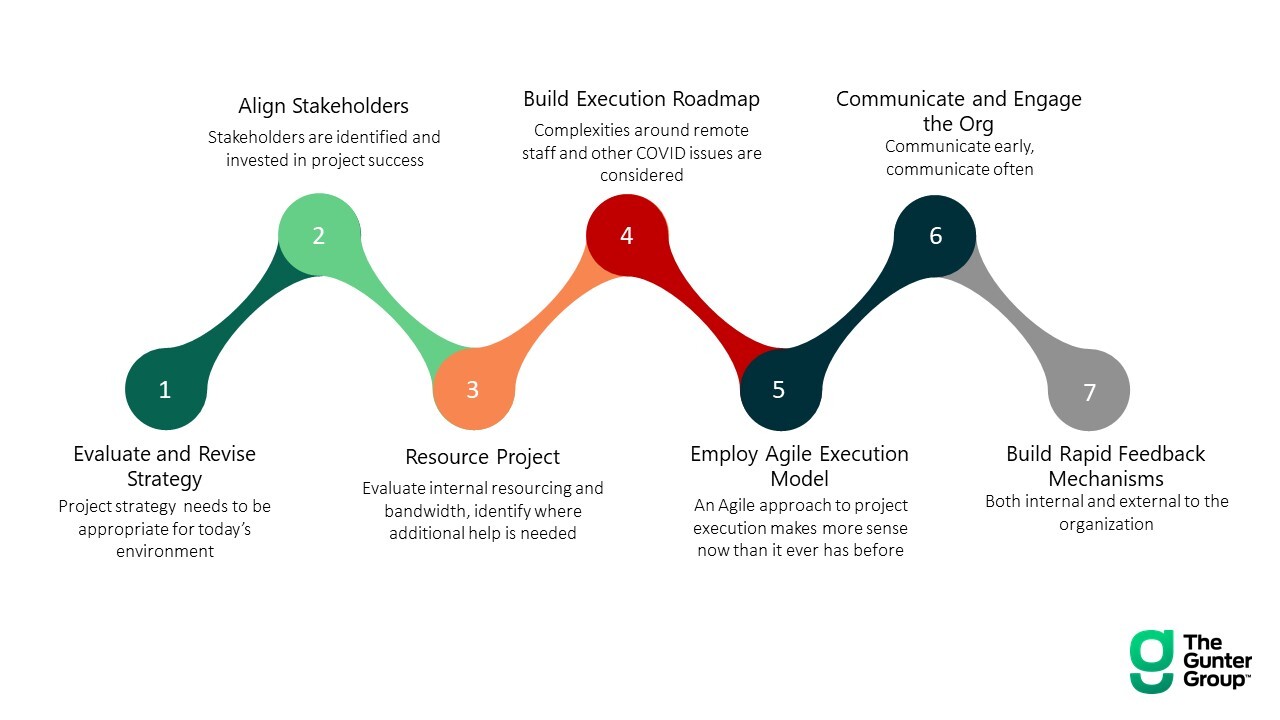
Evaluate and Revise Strategy: As our global situation evolves, public health policies enacted to mitigate the effects of COVID-19 will impact the availability of resources and timing of many projects.
Additionally, it is important to re-evaluate the big questions—those considerations that are less tactical and for which planning is more difficult. How does this project align with the organization’s core values, and are those values changing in response to the impacts of COVID-19?
Lastly, there may be tactical components of the original project strategy that may not be conducive to a COVID-19 environment. For example, brainstorm sessions, project meetings, and testing will likely take place remotely. Timeline and toolset considerations may also need to be adjusted.
Align Stakeholders: Even in the best of times, projects often begin prematurely, before stakeholder alignment is adequately reached. Now more than ever, it is imperative for the success of any reinstated work that stakeholders are informed, aligned, and have a renewed commitment to contribute towards the successful culmination of the project. As appropriate, leaders should seek to foster stakeholder participation and feedback in the prioritization process to align on the purpose of the project and to provide consistent messaging to employees and consumers. Commence replanning efforts by conducting a stakeholder analysis and integrating the findings. Overlooking this vital step could result in major roadblocks and setbacks throughout the remaining life of the project.
Resource Project: The resources originally allocated for the project may now be unavailable, team members may lack required skill sets, or they may not currently have the bandwidth to contribute to another project. Therefore, the need for both external and internal support should be properly assessed.
Recently, McKinsey & Company emphasized the need for leaders to focus on reskilling and upskilling their workforce to deliver new business models in the post-pandemic era. Companies also face a learning curve as managers figure out how to lead their teams virtually, build social capital, and maintain cohesion without the benefit of in-person interactions. As companies contemplate returning to the workplace, a new set of skills is also likely to emerge for the transition.
Sometimes a major reskilling effort isn’t feasible or practical to fill key needs for a project. In this scenario, pulling in outside expertise or resources may be the best option. Consultants are often brought into the fold of a project to fill an experience, knowledge, or skill set gap or even as an extra set of hands for a daunting effort where the organization’s future hiring picture is unclear.
Build Execution Roadmap: As things continue to change, a well developed and clearly communicated execution roadmap will help keep the project team’s eye on the prize. The steps taken so far in restarting the project—updated strategy, aligned and informed stakeholders, and prepared project resources—are the building blocks of an execution roadmap. Identify where it is possible to include flexibility points in an execution strategy. Planning for potential changes to “Plan A” will allow for an easier path forward if additional unexpected changes occur in the life of the project.
Employ Agile Execution Model: There’s no better time than now to embrace an agile methodology. By definition, the agile project management methodology is designed to be collaborative, flexible, and adaptable to change, and the change introduced to organizations by COVID-19 has put it to the ultimate test. Research conducted by McKinsey & Company found that companies with agile practices embedded in their operating models have managed the impact of the COVID-19 crisis better than their non-agile counterparts.
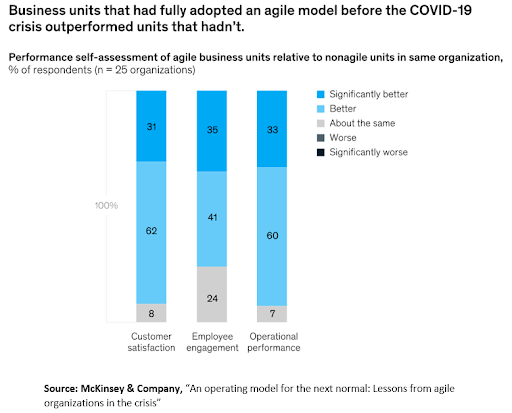
Communicate and Engage the Org: Effective communication and engagement can be challenging, especially given the challenges of physical distance, work-life balance, and a multitude of other distractions. Project details must be communicated to the right people at the right time.
Many organizations are also at the point where employees are hitting conference call and email fatigue. Since the majority of our communications are now limited to back-to-back video calls or an ever-expanding email inbox, communications are at greater risk of being lost in the shuffle.
Fortunately, there are many tools and resources available to help streamline communications in 2020, some of which may already be familiar and some lesser known:
– Facilitation tools (MURAL, retrium, MS Teams, klaxon, miro, STORMZ)
– Communication tools (Skype, Zoom, Google Hangouts)
– Presentations & Meetings (Ideaboardz, Conceptboard, workplace, slack, Google Meet)
– Project Management (Smartsheet, Microsoft Planner, Teamwork, Confluence, Jira, Basecamp, Trello, asana, N)
– Team Building (Kahoot!, TEAM MOOD, Dr. Clue, donut)
– Events (Meetyoo, HEXAFAIR, ENGAGE, VIRTUALIST
Build Rapid Feedback Mechanisms: Integrating feedback loops, both internal and external, into the project’s workflow, such as cadences in the Kanban method, for example, offer a powerful communication tool that fosters efficient and continuous improvement through effective adaptation to the often evolving needs of one’s client. It is valuable to build a mechanism, such as frequent, effective meetings, to facilitate constant and constructive evaluation as a team.
Moving forward with grace
With all the tactical and strategic planning that is needed to evolve an organization or advance a project forward, it is important not to lose sight of the human element. The planning process should be imbued with emotional intelligence, described as the ability to appropriately apply emotion to manage and solve problems—an approach with many tangible and far-reaching benefits within any organization.
In many different ways, it has been a challenging year and people are facing internal and external hurdles that could not have been predicted a year ago. Contributing to a project is a wonderful growth opportunity, gives people a chance to connect with their teammates towards a common goal, and produces tangible results. However, it is more important than ever for leaders to show that they care about their team.
Deeply considering the outcome of new or restarted work on employees and consumers has never been more important. Prioritizing the work ahead should consider not only the immediate benefit to the organization itself but also the benefits of doing right by the people of the organization in the long term.
At The Gunter Group, we can help implement the project leadership and process improvement strategies discussed above. Contact us to learn more about how we can support and optimize your organization.

About the Author:
Kara is a collaborative and detail-oriented consultant specializing in project management, organizational change and strategic communications. She has an ability to jump quickly into complex situations and scenarios, which allows her to understand and deliver on her clients’ key priorities within tight deadlines. Kara is also very skilled at considering issues with a fresh perspective, allowing her to suggest and implement viable solutions that may not have been previously considered by an organization. With a diverse background in communications, marketing analytics, team leadership and project management, Kara has enjoyed bringing strategic solutions to her clients for over 10 years. She has worked in a wide range of industries for many nationally-recognized brands, primarily in the technology, healthcare, sportswear, and early childhood education sectors. Kara holds a B.S in Business Administration and Marketing from Central Washington University. She is also a Certified Scrum Master and PROSCI Certified Change Practitioner. In her free time, Kara enjoys spending time in the great outdoors with her family of four.
LEADING THROUGH CRISIS, OUR VETERANS’ PERSPECTIVE
At The Gunter Group, we are fortunate to have several military veterans on our team who have deep experience leading in times of crisis. They sat down with one of our consultants, Laura Emily, for a conversation about how they are leaning on their backgrounds in the service to navigate our current environment.
We invite you to join us for this rich discussion on the parallels between leading in a warzone or humanitarian environment and leading in a business environment impacted by the coronavirus. Read on below to learn more about each speaker and the leadership topics they cover in the video.
Oregon Market Lead and Principal Consultant
Served 5 years as a Captain in the Air Force
Listen to Matt speak about “Balancing Compassion With Accomplishing a Mission
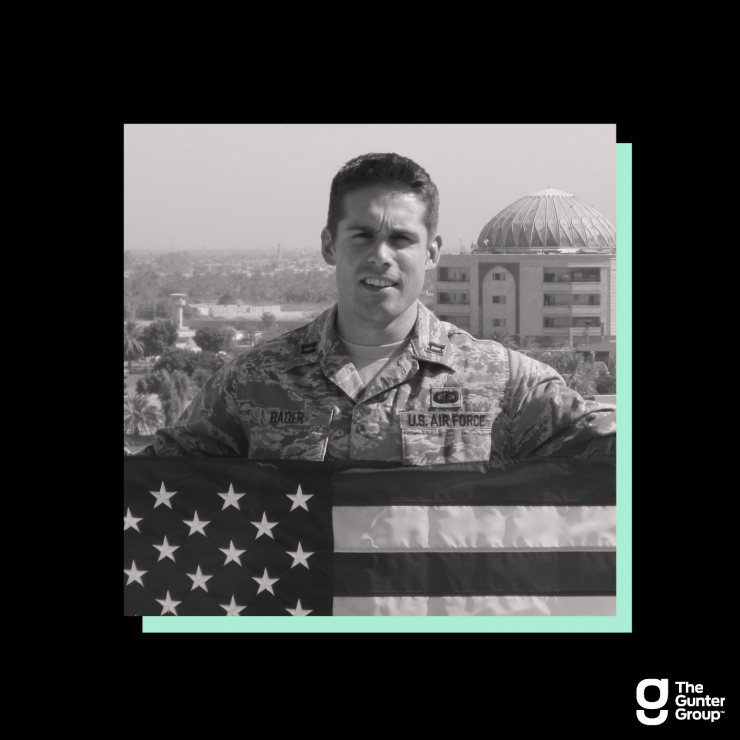
Matt’s passion and leadership purpose is all about helping teams reach their highest potential. He loves building and leading high-performing teams and seeing what can be accomplished when strong values, sound strategy, and a relentless commitment to execution collide. He is a trusted advisor that thrives on building lasting partnerships and driving high-quality solutions for clients. As a results-driven leader with more than 14 years of leadership, strategy, project management, and process improvement experience in a wide variety of complex environments, Matt brings a deep knowledge of implementing enterprise-wide transformations across people, process, and technology domains. He has built and led multifunctional teams to deliver successful solutions in a number of industries to include: retail, education, financial services, healthcare, and government. Matt graduated from the United States Air Force Academy with a B.S. in business management in 2006 and has certifications in program management, LEAN, and contract management. He has spent the majority of his academic, military, and consulting career studying and employing character-based leadership principles in challenging and ambiguous environments. Outside of being a loving husband and father, Matt enjoys the intersection of all things hockey, heavy metal, fitness, and beer.
Northern Nevada Market Lead and Principal Consultant
Served 4 years as a Lieutenant in the Navy
Listen to Tony speak about “Resiliency During Crisis”

Tony builds teams to support strategic change initiatives and helps leaders plan for highly impactful change. Thriving in the face of complex problems, he brings clarity to ambiguous situations and organizational questions. Leaders quickly come to trust Tony as a partner in making their tough decisions. A former Surface Warfare Officer in the U.S. Navy, Tony’s leadership and management philosophy is tempered by a career of bringing calm and planning to high-impact, high-stress scenarios. His track record of success in defining and overcoming challenges in demanding environments has led to consistent portrayals of him as an outstanding manager and a leader among his peers. His skill set is under-girded by his formal education in the Humanities, holding a Bachelors Honors degree in both philosophy and theology from the University of Notre Dame. In addition to an aggressive reading habit, Tony is deeply interested in everything that the Sierra Nevada mountains have to offer. Sun, snow, backpacking, and skiing all keep him, his wife, and kids busy in their free time.
Senior Consultant
Served 6 years as a Captain in the Air Force
Listen to Noah speak about “Maintaining Confidence, Connection, and Healthy Habits”
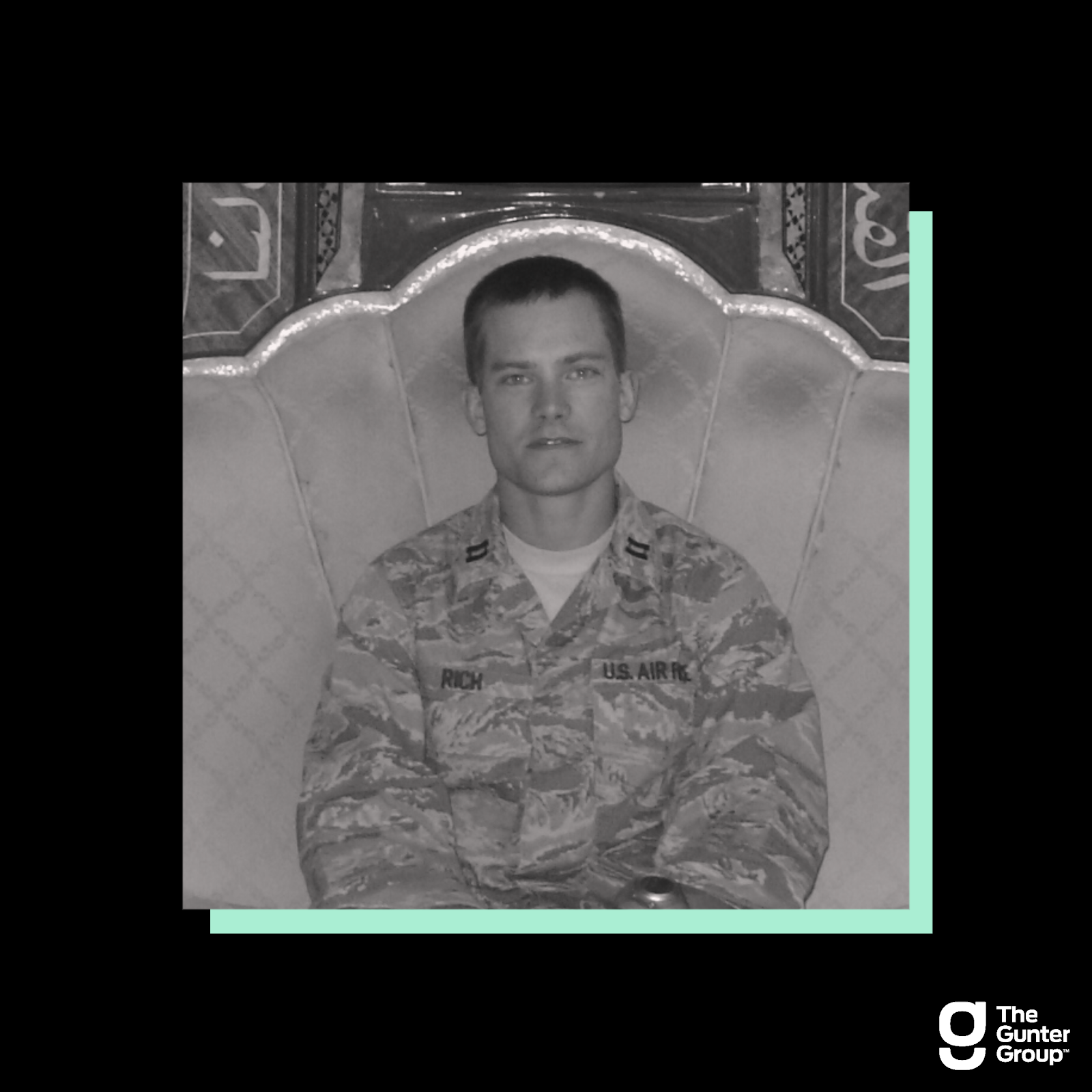
Noah has a clear record of success in driving strategic initiatives across a broad spectrum of industries and business functions. Curious by nature, Noah is able to quickly develop a deep understanding of business problems, develop structured plans, and manage teams to deliver positive results. Noah’s professional experience includes work in government, IT, finance, insurance, manufacturing, construction, health care, education, and international business. He holds a M.B.A from the University of Colorado and a B.S. in meteorology from the U.S. Air Force Academy. Outside of work, Noah spends more time than he should cycling around Oregon.
Account Lead and Senior Consultant
Served 7 years active duty and 3 years in the reserves as a Major in the Marine Corps
Listen to Joe speak about “Maintaining Momentum”

Joseph thrives in digital product and marketing management because of his affinity for analytics and the relative immediacy of data-driven change. Whether managing a host of agencies, internal teams or directly implementing strategies and tactics, he has a wealth of experience bringing products and projects to market. Joseph has more than 15 years experience leading teams, serving in product management, marketing, commercial operations and other roles in the consumer, pharma, life science and technology industries. Whether leading startups to profitable operations or managing multi-million dollar omni-channel marketing budgets, Joseph has demonstrated a path to success, regardless of scale. He earned an M.B.A in marketing from the University of Virginia’s Darden School of Business. Outside of work, Joe is manifesting patience and unconditional love with his two teenage children. On weekends, look for Joseph in the backcountry of the Cascades, cooking for a cycling camp or racing cyclocross.
Account Lead and Senior Consultant
Served 5.5 years as a Captain in the Army
Listen to Jim speak about “Building Your Team”
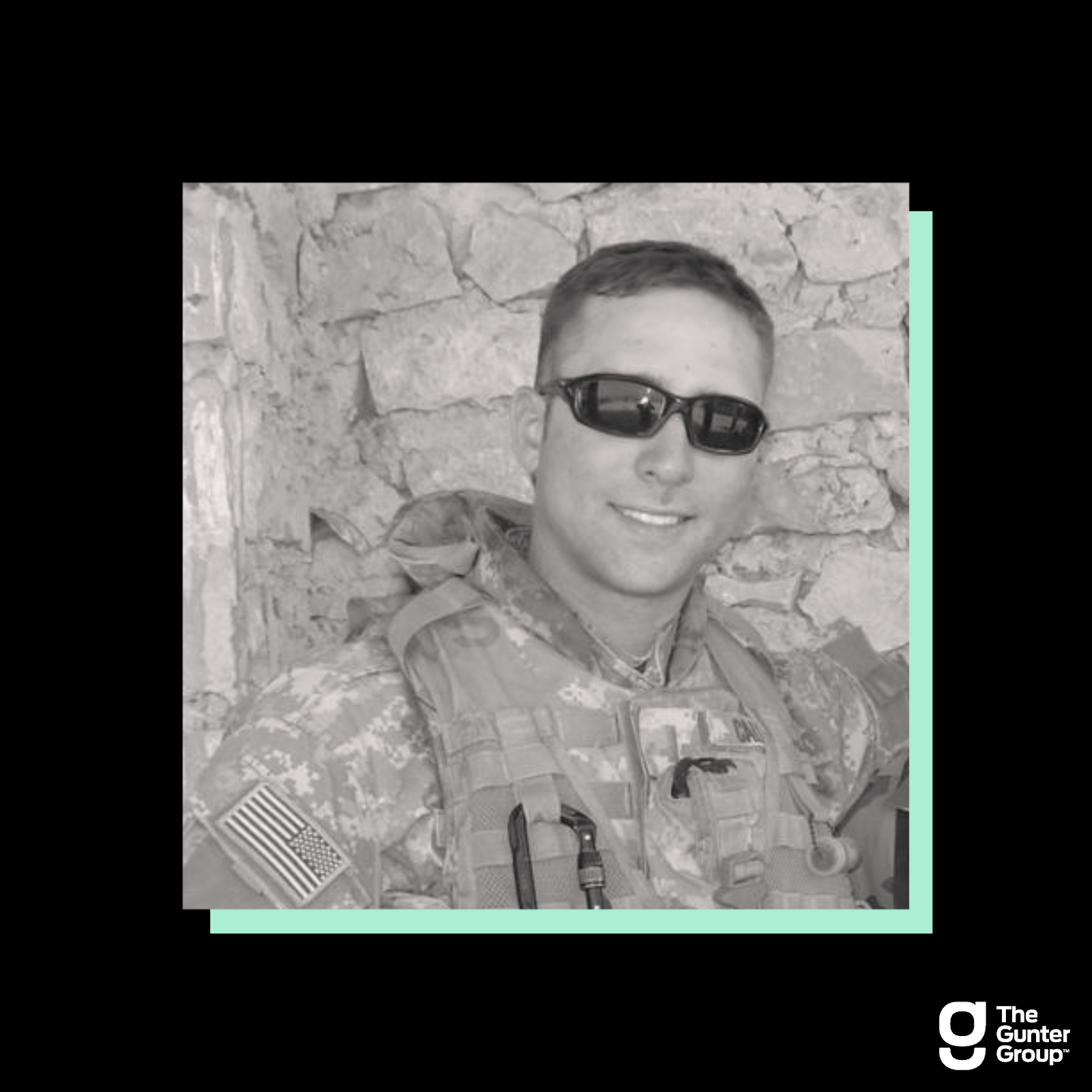
Jim’s collaborative, servant leader approach has earned him the reputation of being a problem solver who consistently gets things done. He has the unique ability to marry tactical actions with strategic outcomes. Jim’s experience spans across multiple industries including military, high tech manufacturing, eCommerce and health care sectors. His areas of expertise are program management, software and new product development, process improvement, and communications strategy. Jim holds an M.B.A. from the University of Portland, an M.A. in human relations from the University of Oklahoma, and a B.A. in political science from Youngstown State University. He is also a Scrum Master and Scaled Agile (SAFe) 4.0 certified.
5 TRAITS TO LOOK FOR WHEN RESOURCING CRITICAL, QUICK TURN PROJECTS
Hiring the right people takes time, the right questions, and a healthy dose of curiosity. What are the most important traits to move critical work forward? How about if you don’t have the luxury of time? And what if the need is short term in nature?
If this sounds familiar, then you may have a critical, quick turn project.
Recently, The Gunter Group worked with a regional healthcare insurance company on the roles necessary to help the company contend with business impacts of the coronavirus.
While the origin of our current collective disruption is uncommon (a pandemic), the business need for resourcing quick turn projects is familiar.
Whether you’re faced with a crisis now, or looking to be prepared for the future, check out these 5 traits that keep organizations moving forward in critical, quick turn projects.
1. Work Horizontally & Vertically. Disruption knows no boundaries. Leaders who can bridge communication gaps both horizontally and vertically within an organization will break down barriers and drive focus. Consider a generalist who can bring a holistic perspective.
2. Ramp Up Quickly: Uncertainty creates a vortex of need. Seek people who love learning. People accustomed to diving into new disciplines are skilled at the process of learning and can move from beginner to expert (or close to it!) at a rapid pace.
3. Navigate Ambiguity. Projects that surface quickly are usually highly ambiguous. Seek people who are energized by the unknown. They have confidence from years of working in uncharted territory to know that they are capable of figuring things out.
4. Embrace Your Culture: Your culture is the key to “how things get done around here” and when time is limited, it is important to have someone who can adapt quickly. Whether considering internal or external support, ensure they have chameleon-like qualities to reflect your company and departmental norms.
5. Tailored Solutions. Solutions need to make sense for your company and situation. Prioritize tailored approaches over cookie cutter solutions.
To illustrate, let’s return to the regional healthcare insurance company’s situation.
As a result of COVID-19, a high volume of government mandates had major impacts throughout the organization. To respond, a centralized task force was organized to assess impact, disseminate information, and ensure timely resolution. For efficiency, the task force formed a hub and spoke model assigning each business area a single point of contact to interface with the task force.
Due to urgency, short-term nature of work, and lack of internal resources, priority was given to onboarding a consultant who could roll up her sleeves and be successful in an ambiguous, urgent, and ever-changing environment as an interface between their task force and critical business functions.
Critical, quick turn projects are a constant as organizations frequently experience disruption whether by instigating or reacting to circumstances. A strong project leader with these 5 traits will help teams navigate uncertainty while achieving desired outcomes. Check out these client outcomes to see how we successfully partner with our clients to help them navigate challenges and drive toward solutions.
A LETTER FROM OUR FOUNDING PARTNER
I founded The Gunter Group in 2011. Like many people that start companies, one of my primary motivators was to create an organization that could reflect my own values and interests. Integrity, trust, service to clients, authenticity, transparency, leadership…all of those were (and are) important to me.
Many people that joined TGG early on are still with the company almost nine years later, and have been joined by many more talented, energetic, and awesome people. On my team, not only do I know the TGGers, I know their spouses, partners and significant others, kids (many since they were born), and a bunch of pets. That’s the way I always wanted it, and I have always felt a strong sense of responsibility for my team.
We have built an incredible group, we have the privilege of serving a wonderful group of client organizations, and we are deeply committed to supporting the communities in which we work. We have built TGG into a sustainable company with a solid foundation and we had a great start to 2020.
And then, COVID-19 happened. The universe saw things differently.
As I write this, we are completing our seventh full week of stay-at-home orders and 100% remote working. Now that some of the initial adjustment shock has worn off, I have spent some time reflecting on our purpose as an organization, the actions we have taken, and some of what may lie ahead.
First, what brings us TGGers together is a shared purpose: we exist to help our team, clients, and communities thrive. The mechanism that gives us the means to achieve our purpose is our company, and we need to survive current circumstances and come out the other side intact for us to continue to be of service. We have taken several steps to ensure the continuity of our business. We applied for the SBA Paycheck Protection Plan loan, and ensured our line of credit was up to date. We signed up for regular communications and updates with government officials in our markets. We formed a COVID-19 focused subgroup within our leadership team, are constantly sharing and discussing information we see, and forming our action plan for going forward. 20% of TGG team members are veterans, and we are leaning on their experience leading in times of crisis (we will share those experiences in an upcoming video).
Second, we have focused on the health and well-being of our team. Transparency is important to us and we have been radically transparent with our team about what we are doing. We have increased communication significantly, and have weekly all-company video calls in addition to written updates. Our leaders have stepped up the frequency of 1:1 meetings with the people on their teams. We have virtual happy hours to keep everyone across the company connected.
Third, we have doubled down on client service. It goes without saying that our clients are our lifeblood and serving them well is what we do best. Some of our client companies are struggling, and it has been painful to experience that with them—they are our colleagues and friends. We have gotten creative wherever we could to ensure continuity of work, working alongside our client teams. We have shared our own experiences in dealing with things like working remotely and in being adaptable wherever helpful. One of our senior consultants recently joined a client team to manage workstreams in their centralized task force setup to manage COVID-19 response efforts.
Fourth, we are considering what comes next. We are thinking deeply about our services, how they are delivered, and what will be most impactful in the future. We are sharing best practices for working in a more digitized world with our clients and networks. We are deepening several of our partnerships with other firms. We are continuing to recruit and look for exceptional talent to join our company when the time is right. In short, we are trying to straddle the line between being realistic about the uncertainty of our current circumstances, but yet remaining optimistic and hopeful about working our way through it.
There is tremendous uncertainty regarding what happens in the next few months, and beyond. I do not believe we will quickly get back to what used to be normal as soon as we start to reopen. I think there will be a slow transition back to something that seems more normal than the circumstances in which we currently find ourselves, but there will be lasting impacts on how we get work done. I think there will be a lot more remote working, video calls, and less travel. There will be more distributed teams. Leaders need to be ready to help people make the transition and be compassionate in their support. For those of us with kids, there will continue to be disruption in childcare and education, and that will reverberate into the workplace. Flexible arrangements will not only be a benefit, they will be necessary.
But there are silver linings in what we have learned. As contrary to inclination as it sounds, our team is communicating with each other better than ever, and in a deeper, more productive way. We are strengthening our most important relationships in our networks outside the company with our clients, partners, and communities because we are working together more closely than ever. And we are not the only ones: we recently conducted a survey and facilitated a webinar on change management in uncertain times in which 70% of respondents said many of their relationships have been strengthened in the last six weeks. I have found it has been helpful just having people in your network to talk to and understand shared experiences.
As we navigate our way through the circumstances caused by COVID-19, we remain focused on our shared purpose as an organization: to work so that our team, our clients, and our communities thrive. Our core values at TGG—honesty, integrity, radical transparency, ability to thrive in ambiguity, taking care of each other—are the pillars on which we lean to navigate through uncertainty. The pillars are more important now than ever. No one has all the answers right now, but whether you are facing a critical moment today or not, we would love to talk to you about our experiences and how our team might help. We remain ready to serve.
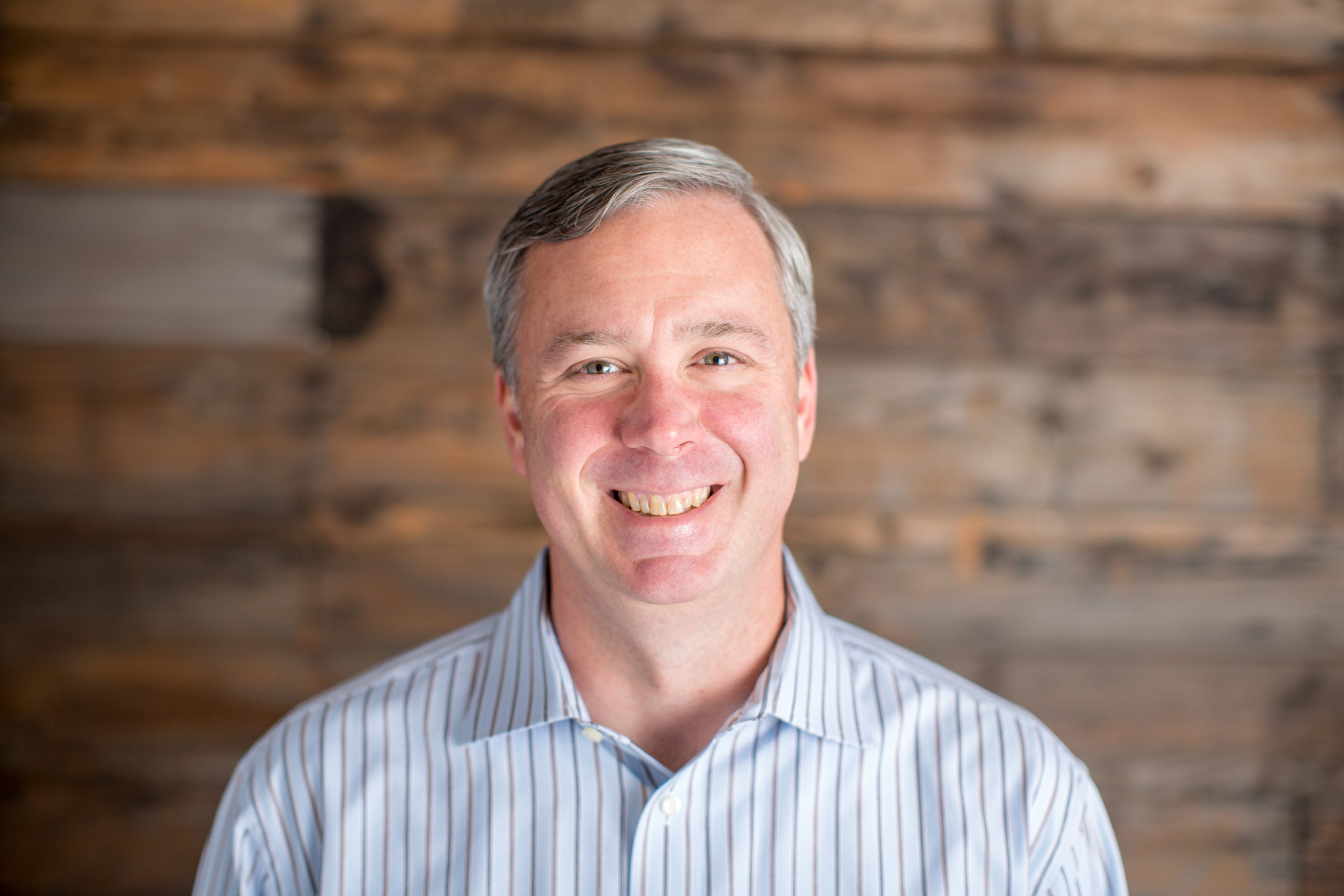
Mike is passionate about client service and leading people. He enjoys watching people grow, develop, and discover their true path. Mike is a visionary and forward thinker with extensive multinational experience and a proven track record of serving clients. With more than 25 years of business leadership and consulting in a wide variety of challenging and ambiguous environments, Mike got his start in the industry at Deloitte Consulting and has since held executive leadership positions in consulting, supply chain services, and public education organizations.
COVID-19: OUR COMMITMENT IN DIFFICULT TIMES
As a global community, we have entered unprecedented and challenging times with major social, governmental, and economic disruptions stemming from COVID-19. Significant concerns around our health and the health of our loved ones and friends, economic dislocation and uncertainty, and the future are on all of our minds. What is certain, however, is that we are all facing this crisis together, and the immediate impacts are real and rapidly evolving.
Our consultants take pride in living out a culture centered around our non-negotiables. Like many of you, over the past few days we have had challenging conversations about how to process the unfolding events and the resulting impacts that each of us is experiencing. We have reacted quickly to adjust the way we work together, making the space for our team to have open and honest conversations about the challenges we all are facing.
How can we balance compassion and commitment to containment efforts with the responsibilities we have to support our families, our coworkers, and our broader communities?
The scope and impacts of COVID-19 are unknown at this point, but the uncomfortable reality is that it is already impacting our communities significantly. Our team has been discussing how we can continue to carry out our lives in the midst of the circumstances in which we find ourselves. We have been asking ourselves how we can balance compassion and commitment to containment efforts with the responsibilities we have to support our families, our coworkers, and our broader communities. These are difficult topics with which we are all wrestling to understand and navigate as the days unfold.
The Gunter Group exists to help realize the potential of our clients, our consultants, and our communities. We are doing our best to support our team and we are working with our clients and the broader business community to support them as well. We are all experiencing real and immediate business challenges in the face of the COVID-19 outbreak. Our commitment to deep partnership and delivering real business value has never been more important than in this time of crisis and we are getting creative in order to support our clients when and where they need us most.
The realities of COVID-19 are unique, but there are core principles for dealing with crisis that we have learned transcend the specifics of this event: remember your core values, focus on the mission, dramatically increase communications, and give your team the support they need to continue moving forward.
We are both Veterans, and have experience leading teams in difficult times and situations. Our unique team also brings years of experience in crisis operations to our clients, whether it is responding to unexpected, external shocks or leading military service members in war zones. Our experience leading in times of crisis drives how we respond to COVID-19, and how we focus our firm’s response. We keep core values, or non-negotiables in our case, at the heart of everything we do. The realities of COVID-19 are unique, but there are core principles for dealing with crisis that we have learned transcend the specifics of this event: remember your core values, focus on the mission, dramatically increase communications, and give your team the support they need to continue moving forward. Most of all, we know that now more than ever, caring for the personal and professional intersections of your workforce and community matters.
We will continue to share practices we have put in place for our own team, but we are also actively living out our commitment to our clients:
Crisis Management–leading, coordinating, or supporting unexpected challenges that have arisen as a result of COVID-19.
Business Continuity–partnering with clients to plan and execute business continuity efforts across a range of business models and industries.
Strategic Momentum–helping clients continue to move their long-term, strategic initiatives forward as they navigate timeline and resource challenges.
Human Resource Constraints–providing interim leadership and staff support for a number of clients in the face of uncertainty.
As this pandemic continues to develop, it will require adaptability to address evolving challenges. However, we know that we will get through this challenge together by focusing on our non-negotiables, remaining committed to our people, clients and communities, and being creative in the face of uncertainty.
We wish everyone in our communities the best as we all continue to navigate through the COVID-19 outbreak.

Tony Schweiss, Principal and Reno Market Leader. Tony builds teams to support strategic change initiatives and helps leaders plan for highly impactful change. Thriving in the face of complex problems, he brings clarity to ambiguous situations and organizational questions. Leaders quickly come to trust Tony as a partner in making their tough decisions.
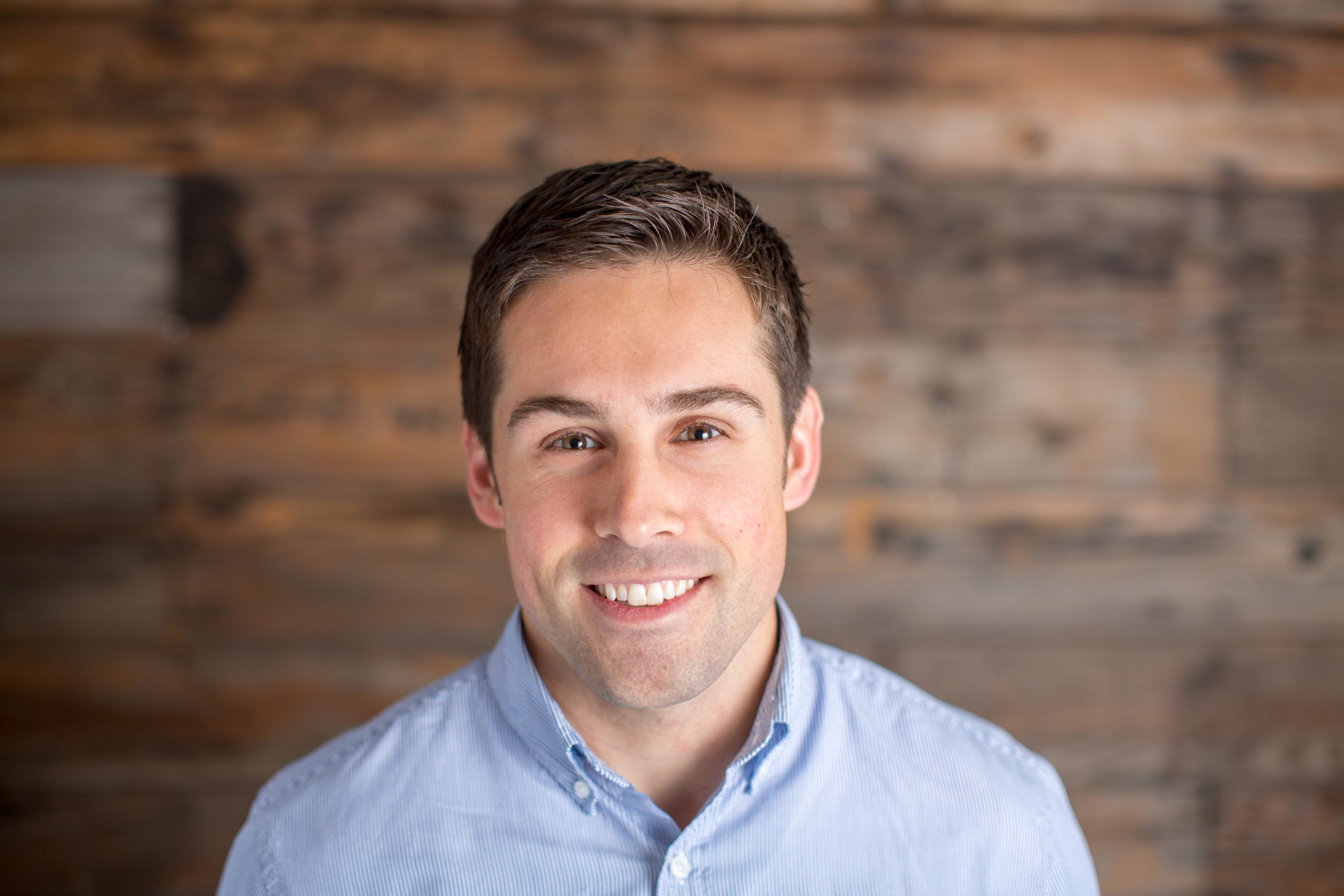
Matt Bader, Principal and Portland Market Leader. Matt’s passion and leadership purpose is all about helping teams reach their highest potential. He loves building and leading high-performing teams and seeing what can be accomplished when strong values, sound strategy, and a relentless commitment to execution collide. He is a trusted advisor who thrives on building lasting partnerships and driving high-quality solutions for clients.
